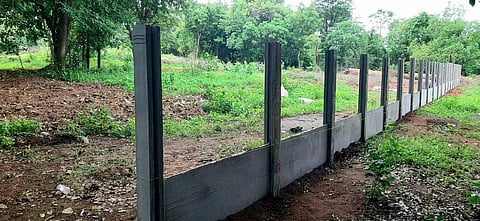

PALAKKAD: The Palakkad municipality’s recent decision which allocated 20 cents of land within the Mattumantha public crematorium to a community organisation has triggered sharp reactions from civil society groups and social justice activists. The move has raised concerns over the creeping institutionalisation of caste-based divisions in public spaces – even in matters of death.
The land, officially demarcated and handed over to the Valiyapadam unit of the Nair Service Society (NSS) through a letter signed by the secretary of the Palakkad municipality dated February 7, 2024, for constructing a cremation shed, was sanctioned through a municipal council resolution passed on September 30, 2023. While the NSS Karayogam office-bearers maintain that the structure is intended as a public facility, the move has come under fire for potentially creating an exclusive zone for a single caste group within a municipal cremation ground.
The public came to know about the development only after the construction of the compound wall around the demarcated plot began on Wednesday.
Critics argue that such decisions risk undermining the equalitarian principles that should govern civic spaces, particularly those related to essential and universal services such as cremation. "A public crematorium must remain truly public. Any step that enables caste-based demarcation – even indirectly – is deeply troubling in a secular democracy," said social activist and local resident Boban Mattumantha.
Adding to the controversy, the official sanction letter issued by the municipality does not include a clear stipulation that the constructed facility must be open to all communities, raising fears that the space could gradually evolve into a caste-exclusive area.
Sukesh Menon, member of the Prathinidhi Sabha (delegates' council) of the NSS and executive member of the Valiyapadam NSS Karayogam, told TNIE that the new cremation shed will remain open to all, asserting their commitment to inclusivity. "There is no question of exclusivity. The shed will be a public space, accessible to everyone regardless of caste or background. It is just that we would develop a 20-cent plot in the 6-acre-odd public crematorium land where 10 bodies can be cremated at a time," he said.
The NSS members plan to build a compound wall, construct a tress-work shed, a pump shed and a space for changing clothes, pave the floor with interlocking bricks, arrange seating facility, and plant saplings on the 20 cents of land, at the cost of around Rs 15 lakh. "We will hand over the gate key to the municipality as soon as the works are over," Sukesh added.
When contacted, Ansal Isaac, secretary of the Palakkad municipality, told TNIE that the NSS is developing the 20 cents of land for the entire section of the society, and the civic body will act swiftly if the developed area is being used by only a particular community. The property and the land will remain under the ownership and control of the municipality, the secretary added.
The incident has sparked a wider debate about the influence of caste in public spaces and the duty of local governments to protect equality and prevent discrimination, as guaranteed by the Constitution.